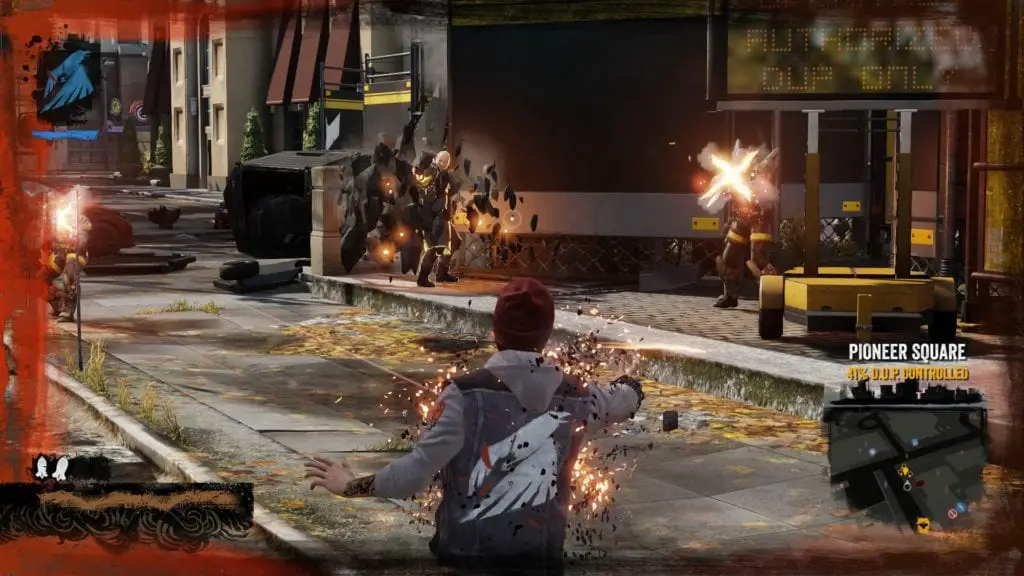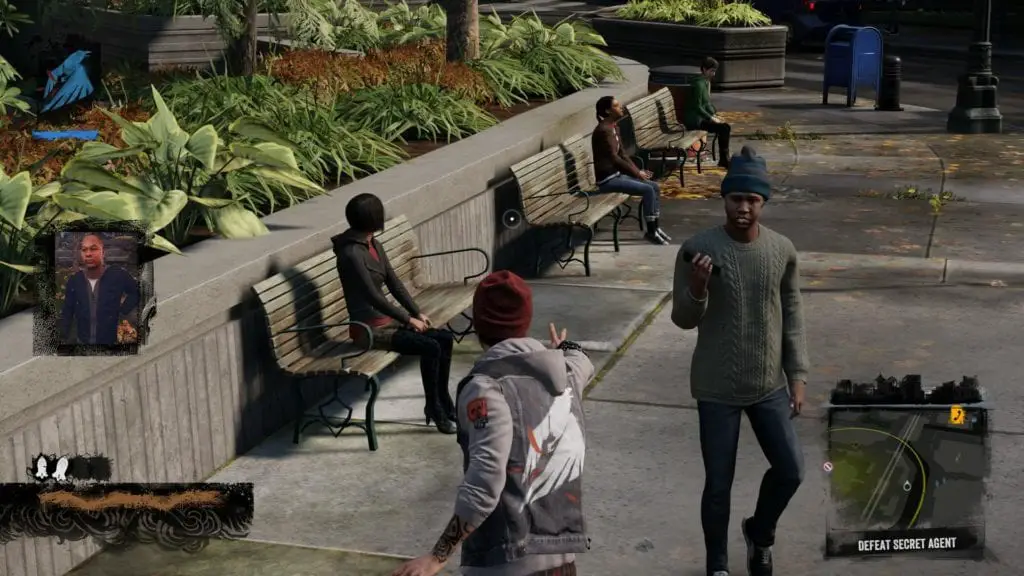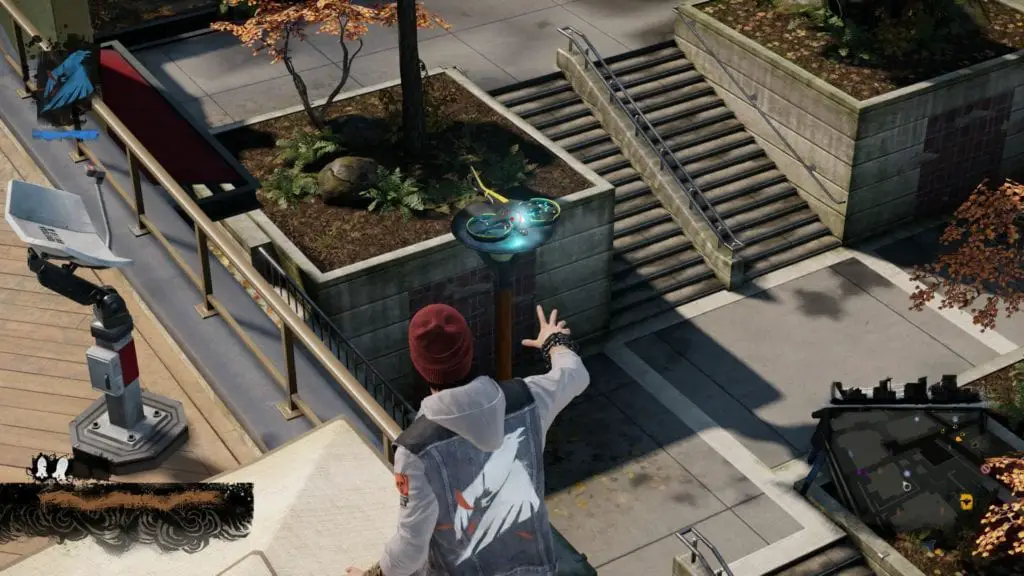Save the tribe.
Seven years have passed since the events of the Playstation 3’s Infamous 2. Cole did a thing, and now the world is free of Conduits.
Or something like that.
I tried playing the first two Infamous games, but an obnoxious sidekick and typical gruff protagonist coupled with weird enemy AI put me off of them within the first few hours. Perhaps that’s a mistake, but it’s a mistake I made all on my own.
It’s a good thing Infamous: Second Son has hardly anything to do with the first two games in the series.
Instead, Second Son focuses on Delsin Rowe, a resident of Washington. He’s a delinquent, spray-painting graffiti onto police billboards while avoiding bringing bad attention to the Akomish, the fictional Native American tribe to which he belongs.
Did I mention his brother Reggie is the sheriff of their small town?
And then things go to hell: a truck carrying three super-powered individuals crashes just outside their town, and Delsin ends up with smoke powers that he can use to dash, throw smoke bombs, or superheat a chain to use as a whip. He’s found out by the Department of United Protection, or D.U.P., a group sponsored by the government that is tasked with rounding up super-powered people, known to their detractors as Bio-Terrorists and their sympathizers as Conduits.
The D.U.P.’s head, Brooke Augustine, is enraged when Delsin refuses to accompany her to her headquarters, and uses her own power over concrete to injure multiple members of the Akomish tribe, including Reggie and Delsin’s surrogate grandmother figure, Betty.
And that’s where the bulk of the game begins: Delsin must travel to Seattle and convince Augustine to reverse the damage she’s done to the Akomish.
Second Son is an open-world action game, allowing players to control Delsin as he explores Seattle, fights the D.U.P., and becomes a protector of the people of Washington.
Or a killer.

The game features a karma system, allowing Delsin to either be good–saving civilians, stopping drug trades, showing mercy to his enemies–or evil–killing his enemies and civilians. My main playthrough was along the good route, although I did watch a friend do the evil version, and I have to say that there isn’t much of a difference. Delsin is more of a jerk in the latter, but it goes against the majority of his characterization otherwise. He can influence the other main characters, too, changing their attitudes toward the events of the games. He still wants to save the Akomish and the plot is largely the same, making the karma system feel like a throw-in because the original Infamous had it.
That isn’t to devalue the rest of the game, because it’s an absolute blast. Delsin’s smoke power can let him jump into the air, hover, dash while hovering, and climb buildings by dashing through vents. He can throw smoke bombs and fire bombs at D.U.P. forces, choking them into submission or outright obliterating them. Further into the game he gets other powers, too; while they follow similar ideas of dashing, stunning, and shooting, they all have unique capabilities. His initial smoke abilities, for instance, move much slower than the others, but allow Delsin more in-air time. He can change abilities on the fly by pulling them from nearby sources, or recharge his current abilities instead. It lends a lot of variety to gameplay.

Because Second Son is an open-world game, it means that the plot progresses through missions that can be started at any time. Should players get bored of Delsin’s fight against Augustine, they can instead cause havoc by destroying D.U.P. bases or stopping drug trades or more, and using Delsin’s superpowers makes every little activity an absolute great time. I felt like I was actually playing a superhero, and by the time the game was over I found myself craving more. It’s a good thing developer Sucker Punch–who previously worked on titles such as the Sly Cooper series–put out a stand-alone DLC featuring one of the game’s female characters. That content is meaty too, although that’s a review for another time.
Infamous isn’t only a lot of fun to play, but it’s also great to look at, as well. Delsin and his crew are expressive, not only in dialogue–Delsin himself is hilarious, quipping left and right–but in sheer motion. His fighting style never looks too professional yet not rough, and always fluid. Seattle can range anywhere from rainy to sunny to simply just overcast, and its inhabitants react to weather accordingly, sporting umbrellas and jackets sometimes yet shorts and shirts other times. Roads appear continuously wet, as does Delsin, during rainy points of the game. They’re little things, but they enhance the immersion, down to the recognizable Seattle landmarks, faux coffee shop storefronts, rainbow flags, and advertisements plastered on the sides of buildings. It’s a bit of a shame that none of the characters are explicitly queer, but we get to see bits and pieces of it through the posters seen throughout the city, which further help the immersion. Though it’s not to the level of, say, Grand Theft Auto, Seattle still feels like a living, breathing place that the events of the game take place in.

Stellar voice acting and sound design lend to that feeling, too. Delsin is vividly portrayed by veteran actor (and currently-everywhere-ever-actor) Troy Baker, and other characters are given life by well-known voices such as Laura Bailey and Travis Willingham. Never once did I feel pulled out of the narrative, and Christine Dunford, who plays Augustine, stood out in particular. She lent a particularly disturbing mix of motherly and sinister to the villain, bringing out multiple dimensions and making for a compelling, non-traditional video game woman. Beyond the voices, Infamous: Second Son uses an interesting mix of rock, progressive, and electronic beats to give Sucker Punch’s Seattle a specific vibe that makes it its own.
My time in Seattle was a joy. Delsin is light on his feet but heavy in his punches, and with the variety of things to do around the city along with a compelling narrative and excellent sound design, I found myself craving more by the time I’d finished Infamous: Second Son.
Good:
- excellent voice-acting
- feels like you’re a superhero; a total blast to play
- simple, yet intriguing narrative
Bad:
- villain’s motivations don’t come until the end
- various powersets only provide different feels for the same kinds of actions
- karma system is rather weak
Play it if: you’re looking for a fun action game, an intriguing (albeit simple) plot, or something to pick up for the Playstation 4.
Infamous: Second Son sells at $39.99USD, available only on Playstation 4. Neither the game nor the Playstation 4 keep track of how long it took to beat, but I would place my play time at around 10 to 15 hours.

